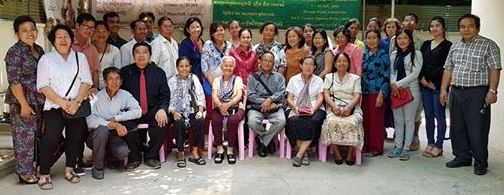Ecumenical leadership development training affirms witnessing together in God’s Mission

“Today, our ecumenical call is to proclaim the Gospel to all God’s people and witness together in participating to build the Kingdom of God”, affirmed a group of church leaders from Cambodia’s rural congregations.
The ecumenical leadership development training organized by the Christian Conference of Asia (CCA) in collaboration with the Kampuchea Christian Council (KCC) was held at the headquarters of the KCC in Phnom Penh, Cambodia from 20 to 23 March.
The theme of the training was ‘Arise, shine; for your light has come: Let Us Witness Together’.
Forty five participants representing grassroots congregations in Cambodia attended the training and tried to contextualize their faith and witness.
In a communique issued towards the end of the training, the participants stated that “we discussed on how the Asian Christians are called to arise, shine and witness together in God’s mission as well as responding to social, political, economic, religious and ecological dimensions”.
“As the Christians in Asia, especially in Cambodia are a minority, their voices have been inadequate although it has significant effectiveness in some places. Israelites had been called to witness to the entire Gentile world; Asian Christians are now called to arise, shine, and witness to the entire Asia and the world as well”.
“God calls us to be in solidarity with the less privileged and transform injustices to justices that gradually enlighten the world. It is God’s ongoing interventions for the restorations of the Asian people, giving them new hope, new vision and empowerment through His Spiritual enlightenment”
The participants representing congregations from different Provinces in Cambodia reiterated that “the articulation of theological vision in relevant ways should enable the faith communities to overcome challenges, and to find new ways to participate in God’s mission in unity“.
The topics discussed in detail include the Asian interreligious contexts, Biblical values to engage in sharing of wealth and resources to the poor and the needy, God’s gifts to create justice and peace in the world.
Rev. Dr. Chuleeparn Sarioontorn, Rev. Dr. Ngur Liana and Dr. Reynaldo Ty facilitated and coordinated the ecumenical enablers training sessions.
The Ecumenical Enablers’ Training in Asia (EETA) programme of CCA focuses on ecumenical formation of church leaders to strengthen ecumenical theological undergirding at the grassroots leadership.
The Kampuchea Christian Council was founded in 1998 as an outcome of special ecumenical ministry among the newly formed churches in post war Cambodia by the Christian Conference of Asia and the World Council of Churches in collaborations with churches and ecumenical partners from different countries.










